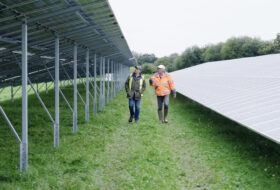Farming Sustainably report, UK
Solar Energy UK

Scheme
In response to widespread misconceptions surrounding solar, Meeting Place launched the Farming Sustainably report in partnership with the UK’s largest solar trade association, Solar Energy UK. Surfacing the voice of farmers across the country, the report spotlights how solar can help agricultural communities to become sustainable; both environmentally and economically.
With an objective to change the narrative on solar, whilst helping farmers diversify income and adopt cleaner technologies, the campaign helped to create a national conversation on the benefits for UK farmers in integrating renewable energy.
Strategy
Meeting Place was brought on board to develop the campaign, draft and design the report, and engage with the farming and solar community, with the positioning SEUK as thought leaders across rural communities and policymakers. A targeted digital ad campaign was deployed to gather the views of hundreds of farmers across the country, which, post-launch, was then supported by regionalised press activity and stakeholder engagement.
We organised briefings with farming associations, facilitated media opportunities to profile farmer case studies and amplified the messaging through social media content, targeting both the farming community and the public. A compelling report summarising the findings helped to demystify misconceptions surrounding solar whilst improving public understanding and sentiment towards the technology.
Outcome
The campaign gained widespread traction across agricultural and regional press, helping to position SEUK as a leading voice in not only the debate on solar, but rural renewable energy more broadly.
In response to our survey of farmers, landowners and tenant farmers, we found:
• 31% of respondents said production was below-average or very low last year, due to adverse weather conditions.
• 44% had below-average or very low incomes.
• 37% said that additional revenue from solar energy would help secure their farm for future generations.
• 60% did not currently have renewable energy – indicating a significant opportunity for growth. However, being unable to connect to the electricity grid and planning constraints were commonly cited as impediments.
The report concludes with advice to farmers, encouraging them to consider solar energy as a viable addition to improve their financial and environmental sustainability and to maintain food production, long-term. Importantly, the report also provides SEUK with a powerful tool to help its members build confidence in renewable energy among farmers, members of the public and policymakers.